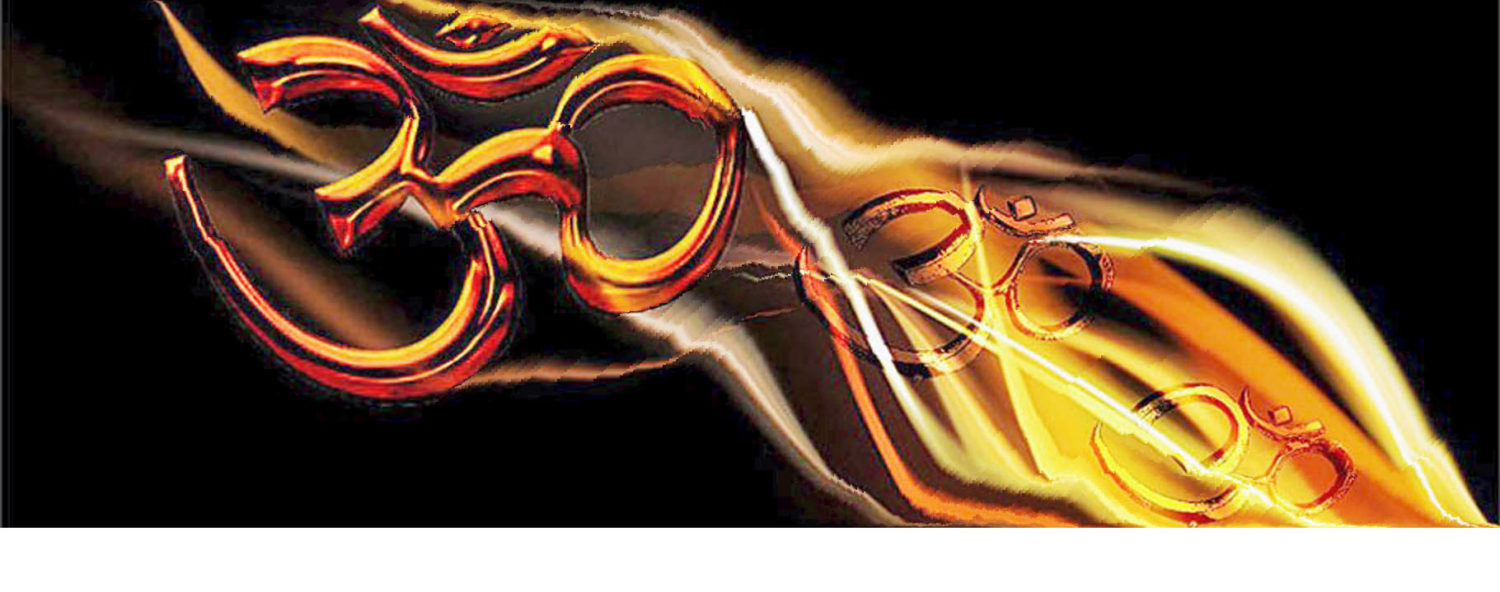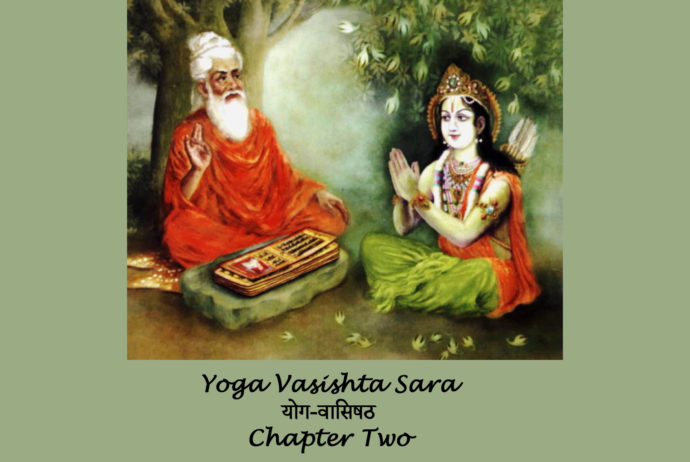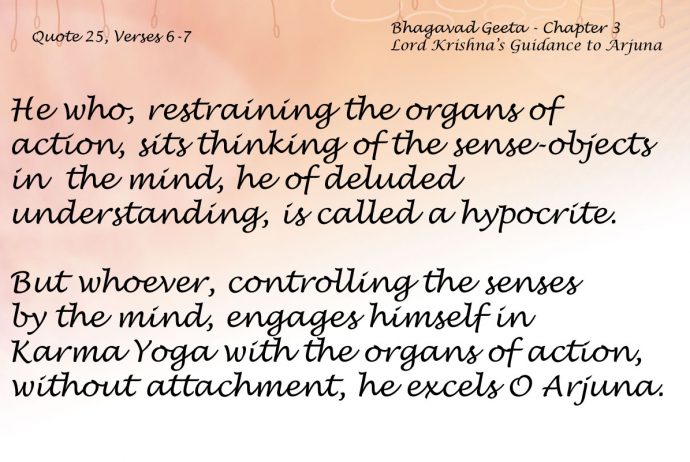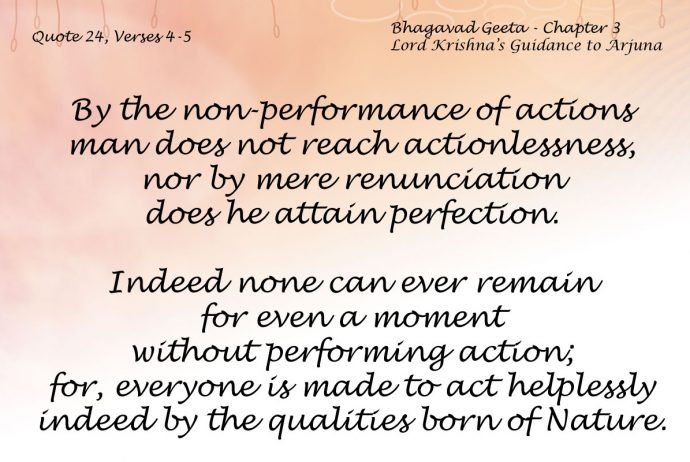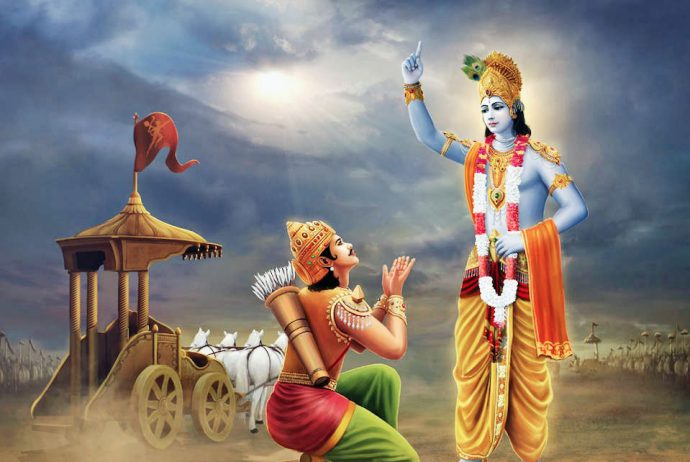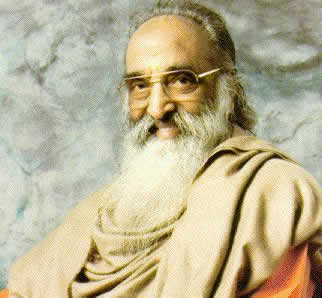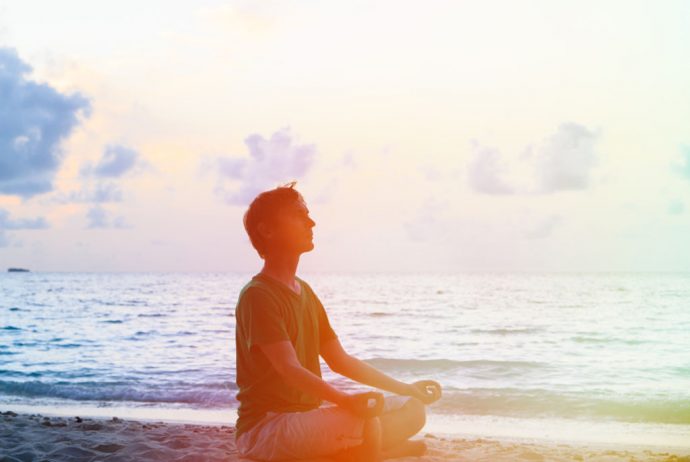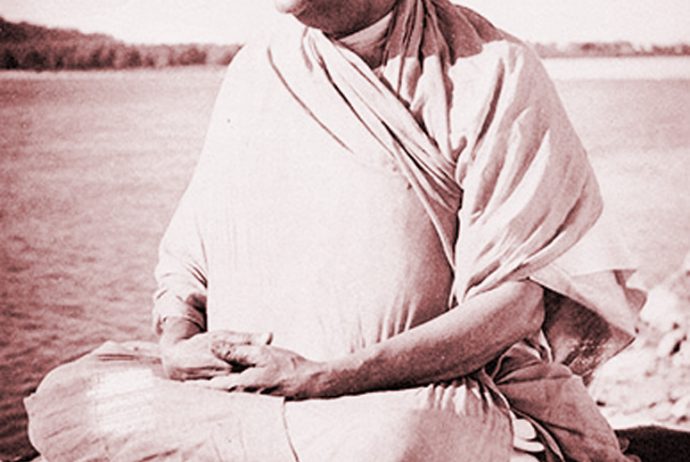The Yoga of Wisdom – Bhagavad Gita – Chapter 4
Sanjaya recounts the condition of Arjuna, who was agitated due to attachment, fear and confusion.
Lord Krishna rebukes Arjuna for his dejection, which was due to Desire or attachment, and urges him to fight. After failing to convince Sri Krishna through his seemingly wise thoughts, Arjuna realizes his helplessness and surrenders himself completely to the Lord, seeking His guidance to get over the conflicts in his mind.
The Lord takes pity on him and proceeds to enlighten him by various means.
1.
Sri Bhagavaan Uvaacha:
Imam vivaswate yogam proktavaan aham avyayam;
Vivaswaan manave praaha manur ikshwaakave’braveet.
1.
The Lord said:
I taught this imperishable Yoga to Vivasvan; he told it to Manu; Manu proclaimed it to Ikshvaku.
2.
Evam paramparaa praaptam imam raajarshayo viduh;
Sa kaaleneha mahataa yogo nashtah parantapa.
2.
This, handed down thus in regular succession, the royal sages knew. This Yoga, by a long lapse of time, has been lost here, Oh Parantapa (burner of foes)!
3.
Sa evaayam mayaa te’dya yogah proktah puraatanah; Bhakto’si me sakhaa cheti rahasyam hyetad uttamam.
3.
That same ancient Yoga has been today taught to you by Me, for, you are My devotee and friend; it is the supreme secret.
4.
Arjuna Uvaacha:
Aparam bhavato janma param janma vivaswatah;
Katham etadvijaaneeyaam twam aadau proktavaan iti.
4.
Arjuna said:
Later on was Your birth, and prior to it was the birth of Vivasvan (the Sun); how am I to understand that You taught this Yoga in the beginning?
5.
Sri Bhagavaan Uvaacha:
Bahooni me vyateetaani janmaani tava chaarjuna;
Taanyaham veda sarvaani na twam vettha parantapa.
5.
The Lord said:
Many births of Mine have passed, as well as of thine, Oh Arjuna! I know them all but you know not, Oh Parantapa!
6.
Ajo’pi sannavyayaatmaa bhootaanaam eeshwaro’pi san;
Prakritim swaam adhishthaaya sambhavaamyaatmamaayayaa.
6.
Though I am unborn and of imperishable nature, and though I am the Lord of all beings, yet, ruling over My own Nature, I am born by My own Maya.
7.
Yadaa yadaa hi dharmasya glaanir bhavati bhaarata;
Abhyutthaanam adharmasya tadaatmaanam srijaamyaham.
7.
Whenever there is a decline of righteousness, Oh Arjuna, and rise of unrighteousness, then I manifest Myself!
8.
Paritraanaaya saadhoonaam vinaashaaya cha dushkritaam;
Dharma samsthaapanaarthaaya sambhavaami yuge yuge.
8.
For the protection of the good, for the destruction of the wicked, and for the establishment of righteousness, I am born in every age.
9.
Janma karma cha me divyam evam yo vetti tattwatah;
Tyaktwa deham punarjanma naiti maameti so’rjuna.
9.
He who thus knows in true light My divine birth and action, after having abandoned the body is not born again; he comes to Me, Oh Arjuna!
10.
Veetaraagabhayakrodhaa manmayaa maam upaashritaah;
Bahavo jnaana tapasaa pootaa madbhaavam aagataah.
10.
Freed from attachment, fear and anger, absorbed in Me, taking refuge in Me, purified by the fire of knowledge, many have attained to My Being.
11.
Ye yathaa maam prapadyante taamstathaiva bhajaamyaham;
Mama vartmaanuvartante manushyaah paartha sarvashah.
11.
In whatever way men approach Me, even so do I reward them; My path do men tread in all ways, Oh Arjuna!
12.
Kaangkshantah karmanaam siddhim yajanta iha devataah;
Kshipram hi maanushe loke siddhir bhavati karmajaa.
12.
Those who long for success in action in this world offer sacrifice to the gods, because success is quickly attained by men through action.
Note: ~Sacrifice
13.
Chaaturvarnyam mayaa srishtam gunakarma vibhaagashah;
Tasya kartaaram api maam viddhyakartaaram avyayam.
13.
The fourfold caste system has been created by Me according to the differentiation of Guna and Karma; though I am the author thereof, know Me as the non-doer and immutable.
14.
Na maam karmaani limpanti na me karmaphale sprihaa;
Iti maam yo’bhijaanaati karmabhir na sa badhyate.
14.
Actions do not taint Me, nor have I a desire for the fruits of actions. He who knows Me thus is not bound by actions.
15.
Evam jnaatwaa kritam karma poorvair api mumukshubhih;
Kuru karmaiva tasmaat twam poorvaih poorvataram kritam.
15.
Having known this, the ancient seekers after freedom also performed actions; therefore, do you perform actions as did the ancients in days of yore.
16.
Kim karma kim akarmeti kavayo’pyatra mohitaah;
Tat te karma pravakshyaami yajjnaatwaa mokshyase’shubhaat.
16.
What is action? What is inaction? As to this even the wise are confused. Therefore, I shall teach you such action (the nature of action and inaction), by knowing which you shall be liberated from the evil (of Samsara, the world of birth and death).
17.
Karmano hyapi boddhavyam boddhavyam cha vikarmanah;
Akarmanashcha boddhavyam gahanaa karmano gatih.
17.
For, certainly the true nature of action (enjoined by the scriptures) should be known, also of forbidden (or unlawful) action, and of inaction; hard to understand is the nature (path) of action.
18.
Karmanyakarma yah pashyed akarmani cha karma yah;
Sa buddhimaan manushyeshu sa yuktah kritsnakarmakrit.
18.
He who sees inaction in action and action in inaction, he is wise among men; he is a Yogi and performer of all actions.
Note: It is the idea of agency, the idea of “I am the doer” that binds man to worldliness. If this idea vanishes, action is no action at all. It does not bind one to worldliness. This is inaction in action. But if a man sits quietly, thinking of actions and that he is their doer, he is ever doing actions. This is referred to as action in inaction.
19.
Yasya sarve samaarambhaah kaamasankalpa varjitaah;
Jnaanaagni dagdhakarmaanam tam aahuh panditam budhaah.
19.
He whose undertakings are all devoid of desires and selfish purposes, and whose actions have been burnt by the fire of knowledge, him the wise call a Sage.
20.
Tyaktwaa karmaphalaasangam nityatripto niraashrayah;
Karmanyabhipravritto’pi naiva kinchit karoti sah.
20.
Having abandoned attachment to the fruit of the action, ever content, depending on nothing, he does not do anything though engaged in activity.
21.
Niraasheer yatachittaatmaa tyaktasarvaparigrahah;
Shaareeram kevalam karma kurvannaapnoti kilbisham.
21.
Without hope and with the mind and the self controlled, having abandoned all greed, doing mere bodily action, he incurs no sin.
22.
Yadricchaalaabhasantushto dwandwaateeto vimatsarah;
Samah siddhaavasiddhau cha kritwaapi na nibadhyate.
22.
Content with what comes to him without effort, free from the pairs of opposites and envy, even-minded in success and failure, though acting, he is not bound.
23.
Gatasangasya muktasya jnaanaavasthitachetasah;
Yajnaayaacharatah karma samagram pravileeyate.
23.
To one who is devoid of attachment, who is liberated, whose mind is established in knowledge, who works for the sake of sacrifice (for the sake of God), the whole action is dissolved.
24.
Brahmaarpanam brahmahavirbrahmaagnau brahmanaa hutam;
Brahmaiva tena gantavyam brahmakarmasamaadhinaa.
24.
Brahman is the oblation; Brahman is the melted butter (ghee); the oblation poured into the fire of Brahman by Brahman; Brahman certainly shall be reached by him who always sees Brahman in action.
Note: This is wisdom-sacrifice.
25.
Daivam evaapare yajnam yoginah paryupaasate;
Brahmaagnaavapare yajnam yajnenaivopajuhwati.
25.
Some Yogis perform sacrifice to the gods alone, while others (who have realized the Self) offer the Self as sacrifice by the Self in the fire of Brahman alone.
26.
Shrotraadeeneendriyaanyanye samyamaagnishu juhwati;
Shabdaadeen vishayaananya indriyaagnishu juhwati.
26.
Some again offer hearing and other senses as sacrifice in the fire of restraint; others offer sound and various objects of the senses as sacrifice in the fire of the senses.
27.
Sarvaaneendriya karmaani praanakarmaani chaapare;
Aatmasamyamayogaagnau juhwati jnaanadeepite.
27.
Others again sacrifice all the functions of the senses and those of the breath (vital energy or Prana) in the fire of the Yoga of self-restraint kindled by knowledge.
28.
Dravyayajnaas tapoyajnaa yogayajnaastathaapare;
Swaadhyaayajnaana yajnaashcha yatayah samshitavrataah.
28.
Some again offer wealth, austerity and Yoga as sacrifice, while the ascetics of self-restraint and rigid vows offer study of scriptures and knowledge as sacrifice.
29.
Apaane juhwati praanam praane’paanam tathaa’pare;
Praanaapaana gatee ruddhwaa praanaayaamaparaayanaah.
29.
Others offer as sacrifice the outgoing breath in the incoming, and the incoming in the outgoing, restraining the courses of the outgoing and the incoming breaths, solely absorbed in the restraint of the breath.
Note: This is Pranayama : controlled inhalation, retention and exhalation of breath.
30.
Apare niyataahaaraah praanaan praaneshu juhwati;
Sarve’pyete yajnavido yajnakshapita kalmashaah.
30.
Others who regulate their diet offer life-breaths in life-breaths; all these are knowers of sacrifice, whose sins are all destroyed by sacrifice.
31.
Yajnashishtaamritabhujo yaanti brahma sanaatanam;
Naayam loko’styayajnasya kuto’nyah kurusattama.
31.
Those who eat the remnants of the sacrifice, which are like nectar, go to the eternal Brahman. This world is not for the man who does not perform sacrifice; how then can he have the other, Oh Arjuna?
Note: They go to the eternal Brahman after attaining knowledge of the Self through purification of the mind by performing the above sacrifices. He who does not perform any of these is not fit even for this miserable world. How then can he hope to get a better world than this?
32.
Evam bahuvidhaa yajnaa vitataa brahmano mukhe;
Karmajaan viddhi taan sarvaan evam jnaatwaa vimokshyase.
32.
Thus, various kinds of sacrifices are spread out before Brahman, the Self. Know them all as born of action, and knowing thus, you shall be liberated.
33.
Shreyaan dravyamayaadyajnaaj jnaanayajnah parantapa;
Sarvam karmaakhilam paartha jnaane parisamaapyate.
33.
Superior is wisdom-sacrifice, to sacrifice with objects, Oh Parantapa! All actions in their entirety, Oh Arjuna, culminate in knowledge!
34.
Tadviddhi pranipaatena pariprashnena sevayaa;
Upadekshyanti te jnaanam jnaaninas tattwadarshinah.
34.
Know that by extended surrender and reverence, by question and by service, the wise who have realised the Truth will instruct thee in (that) knowledge.
35.
Yajjnaatwaa na punarmoham evam yaasyasi paandava;
Yena bhootaanyasheshena drakshyasyaatmanyatho mayi.
35.
Knowing that, you shall not, Oh Arjuna, again become deluded like this; and by that you shall see all beings in thy Self and also in Me!
36.
Api chedasi paapebhyah sarvebhyah paapakrittamah;
Sarvam jnaanaplavenaiva vrijinam santarishyasi.
36.
Even if you the most sinful of all sinners, yet you shall certainly cross all sins by the raft of knowledge.
Note: One can overcome sin through Self-knowledge.
37.
Yathaidhaamsi samiddho’gnir bhasmasaat kurute’rjuna;
Jnaanaagnih sarvakarmaani bhasmasaat kurute tathaa.
37.
As the blazing fire reduces fuel to ashes, Oh Arjuna, so does the fire of knowledge reduce all actions to ashes!
38.
Na hi jnaanena sadrisham pavitram iha vidyate;
Tat swayam yogasamsiddhah kaalenaatmani vindati.
38.
Indeed there is no purifier in this world like Self-knowledge. He who is perfected in Yoga finds it in the Self in time.
39.
Shraddhaavaan labhate jnaanam tatparah samyatendriyah;
Jnaanam labdhvaa paraam shaantim achirenaadhigacchati.
39.
The man who is full of faith, who is devoted to it, and who has subdued all the senses, obtains (this) knowledge; and, having obtained the knowledge, he goes at once to the supreme peace.
40.
Ajnashchaashraddhadhaanashcha samshayaatmaa vinashyati;
Naayam loko’sti na paro na sukham samshayaatmanah.
40.
The ignorant, the faithless, the doubting self proceeds to destruction; there is neither this world nor the other nor happiness for the doubting.
41.
Yogasannyasta karmaanam jnaanasamcchinnasamshayam;
Aatmavantam na karmaani nibadhnanti dhananjaya.
41.
He who has renounced actions by Yoga, whose doubts are rent asunder by knowledge, and who is self-possessed,—actions do not bind him, Oh Arjuna!
42.
Tasmaad ajnaanasambhootam hritstham jnaanaasinaatmanah;
Cchittwainam samshayam yogam aatishthottishtha bhaarata.
42.
Therefore, with the sword of knowledge (of the Self) cut asunder the doubt of the Self born of ignorance, residing in thy heart, and take refuge in Yoga; arise, Oh Arjuna!
Hari Om Tat Sat
Iti Srimad Bhagavadgeetaasoopanishatsu Brahmavidyaayaam Yogashaastre Sri Krishnaarjunasamvaade Jnaanavibhaagayogo Naama Chaturtho’dhyaayah
Thus in the Upanishads of the glorious Bhagavad Gita, the science of the Eternal, the scripture of Yoga, the dialogue between Sri Krishna and Arjuna, ends the fourth discourse entitled: “The Yoga of Wisdom”
